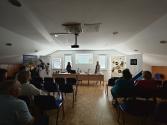At the AGRA 2025 Fair in Gornja Radgona, Slovenia, the Biotechnical Faculty of the University of Ljubljana, ZRS Koper, KOTO d.o.o., and the Slovenian Association for Conservation Agriculture organized an interactive workshop within the European project Waste4Soil. The session explored how residues from the food industry could be transformed into soil improvers and biostimulants, helping to replace imported mineral fertilizers and strengthen the circular bioeconomy.
The participants shared their views on benefits, risks, and market opportunities. Soil improvers were widely understood as materials that improve soil structure, water retention, organic matter, and microbial activity, offering long-term benefits compared to conventional fertilizers. Key advantages highlighted were reduced waste, improved soil health, lower dependency on imports, and climate benefits. However, concerns were raised about pathogens, heavy metals, microplastics, product variability, and consumer acceptance, where the market price is also a very important factor.
Market potential was seen especially in organic farming, permanent crops, horticulture, and gardening. The answer to the question of whether they would use a developed soil improver was related to the favorable price-quality ratio, strong certification and quality assurance, and the replacement of mineral fertilizers. While most participants trusted analytical methods and CE certification, many felt consumers are not yet ready to embrace products made from food waste. The word “waste” has a negative connotation regardless of the real quality of the product after processing. Education, transparency, and clearer legislation were identified as crucial for building trust.
The workshop confirmed both the promise and the challenges of soil improvers from food residues. To move forward, stakeholders stressed the need for harmonized legislation, pilot projects, farmer education, certification systems, and public awareness campaigns. These steps are vital for turning waste into a valuable resource for sustainable agriculture in Slovenia.


